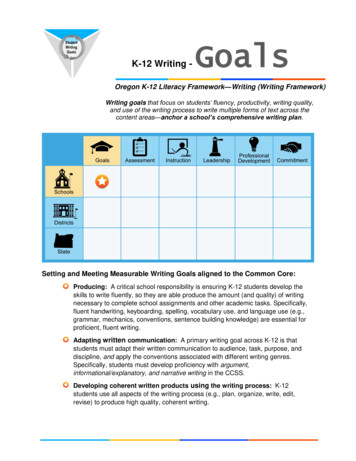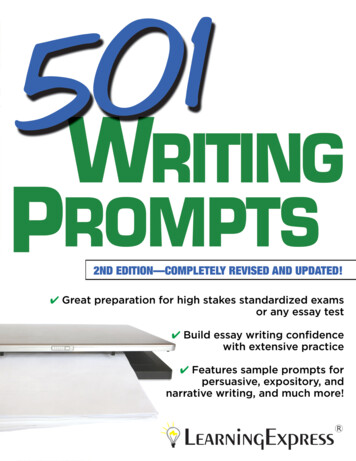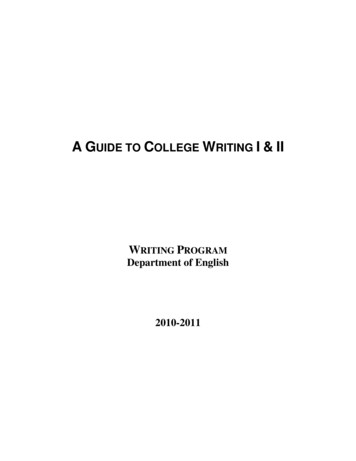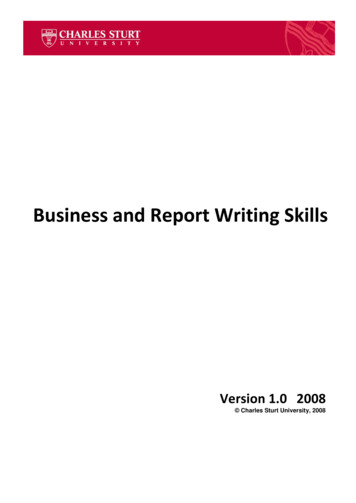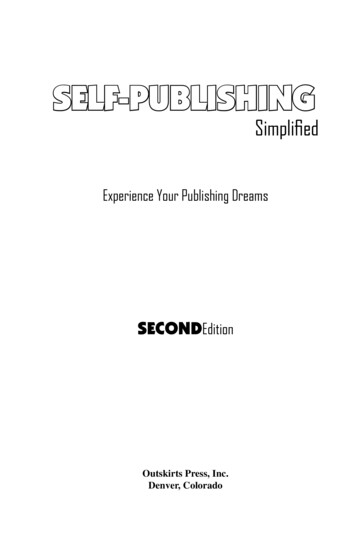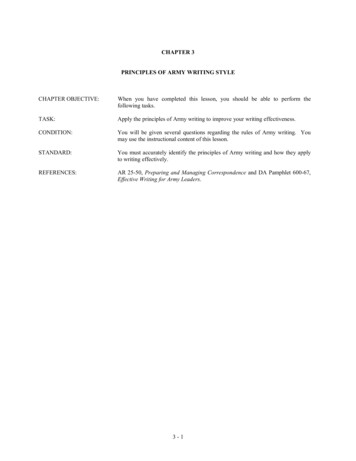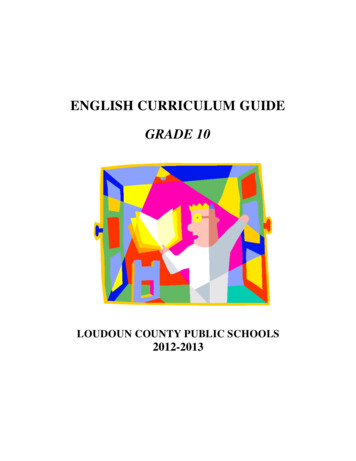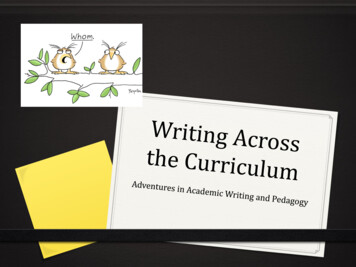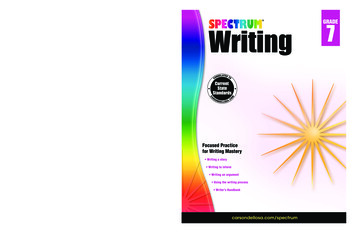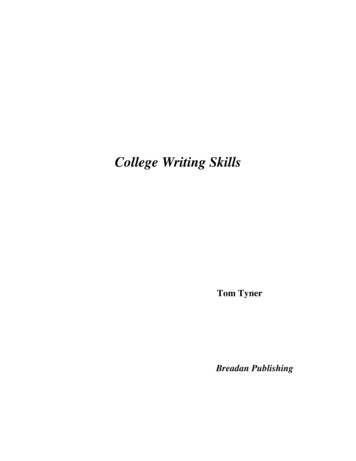
Transcription
College Writing SkillsTom TynerBreadan Publishing
Breadan PublishingCollege Writing SkillsTom TynerCopyright 2016 by Breadan PublishingAll rights reserved. No part of this publication may be produced or transmitted in any form or byany means, electronic or mechanical, including photocopy, recording, or any information storageand retrieval system, without permission in writing from the publisher.Address for Domestic and International OrdersBreadan Publishing4706 N. Quail Lake Dr.Clovis, CA 93619Website:www.breadanpublishing.comTelephone: 559-291-2152 FaxFax number: 559-291-1978Printed in the United States of AmericaISBN:Breadan Publishing
PrefaceCollege Writing Skills is a process-oriented textbook written to help students develop theircollege-level writing skills. The intent of College Writing Skills is to help prepare students forsuccess in required college writing courses, in courses across the curriculum that require writing,and in occupations beyond college. Students learn by writing, and the textbook provides avariety of writing assignments that require you to develop and apply different writing andthinking skills as you progress through the book.Essay WritingIn college composition courses, students write a variety of essays. In College Writing Skills, youwrite a different type of essay in each unit of the textbook, twelve essays in all. To engage yourinterest and allow you to draw upon your experience and knowledge, you choose your ownwriting topic for each type of essay: narrative, expository, persuasive, comparative,problem/solution, and critique.Along with your twelve essay assignments, you also write timed in-class essays which willhelp prepare you for in-class writing in other English courses as well as essay tests across thecurriculum. Experience is the best teacher for writing under in-class time constraints, andCollege Writing Skills provides you with eleven such experiences.Writing ProcessIn each unit, you use a writing process to develop your essays. The basic process of prewriting,drafting, revision, and editing is repeated in each unit, with new instructional elements presentedin each section that apply to the type of essay you are writing. The process is repeated in eachunit so that you become familiar enough with it to use for any writing you may do.The text also recognizes the individual differences among writers. For some writers,prewriting may involve detailed planning while for others, it may involve coming up with anidea to get started. The text recognizes such differences and allows for individual flexibilitywithin the writing process rather than a one-size-fits-all model. The textbook also recognizes thatsome students come to the course with considerable writing experience, and you are encouragedto take both what you find valuable from the text and from your previous writing experiences tocreate the most effective personal writing process.Importance of RevisionCollege Writing Skills also strongly emphasizes the role of revision in the writing process.Throughout the text, you work on revising and improving your writing in a number of areas:wording, organization, content development, paragraphing, openings and conclusions,transitional wording, and so on. The text provides specific revision guidelines for the type ofwriting you do in each unit and emphasizes the role that revision has for all writers.
Writing CorrectnessAs the last step in the writing process, you proofread and edit your essay drafts to eliminateerrors. Being able to write “correctly” – using correct grammar, punctuation, and spelling – iscritical to your writing success in college and beyond and an achievable goal.Within each unit, the text provides instruction in the areas of punctuation, grammar usage,and spelling where writers have the most problems: run-on sentences and comma splices,sentence fragments, comma usage, subject-verb agreement, and so on. You also learn toproofread a draft effectively, looking in particular for your personal error tendencies.Writing as CommunicationCollege Writing Skills also emphasizes writing as a form of communication. To that end, youwrite for different reading audiences, including your classmates, and for a particular purpose: toinform, entertain, influence, educate, or move readers to action. The writing assignments in thetext are “real” in the sense that they are written for others to read and for particular purposes.Writing SamplesThroughout the text are sample essays – first drafts and revised versions - that you can use innumber of ways: to get ideas for your writing, to see how writers develop, organize, andparagraph their essays, to read and evaluate different openings and conclusions, to see howwriters develop and support a thesis, or to see how writers incorporate research material intotheir essays. The sample essays also provide models for each type of essay that you write.ReadingsIn each unit, you “take a break” from writing between essay assignments to read some in-textessays written by published writers. You read them for your personal enjoyment, to see howother writers develop their essays, and to get some ideas for your own writing. The “Questionsfor Discussion” at the end of each essay serve to initiate class or group discussions, includinghow the topics and issues in the essays may relate to your own experiences.
Table of ContentsUnit One: Narrative WritingWriting ReflectionNarrative WritingWriting ProcessPrewritingFocusing Your TopicFree Writing133455DraftingProviding DescriptionDescriptive WordsPower of VerbPower of AdjectivesFirst-Draft Guidelines8810101215A Little Logic17RevisionSentence WordingRevision Guidelines ssPeer Review19192327EditingCorrect WritingIrregular VerbsRun-on SentencesEditing Guidelines3030313538A Little Logic39Reading Break“In the Face of Adversity,”Nelson Mandela“Escape,” Park Ji Woo404043Using Personal Experiencefor Support46PrewritingTopic Selection4747DraftingPresenting Your PointDrafting Guidelines494951A Little Logic53RevisionRevision Guidelines5455EditingEditing Guidelines5859Timed WritingsWriting the EssayTimed Writing One606063
Unit Two: Expository WritingPrewritingTopic SelectionAudience and PurposeProcess Considerations65656667A Little Logic122RevisionRevision Guidelines123123DraftingOpening ParagraphsClosing ParagraphsDrafting Guidelines68687071EditingEditing Guidelines127128Timed Writing Three129A Little Logic73RevisionTransitional WordingRevision Guidelines747478EditingSubject-verb AgreementComma UsageEditing Guidelines83838996Timed EssayTimed Writing Two9799A Little Logic99Reading Break“What Pregnant Women Won’tTell You,” Elise Anders“Helping the Homeless,”Eduard Guzman100PrewritingTopic SelectionGenerating MaterialAudience and Purpose107107108109DraftingParagraph DevelopmentProviding ExamplesDrafting Guidelines110110114119100104
Unit Three: Persuasive WritingPrewritingTopic SelectionBrainstormingThesis StatementThesis SupportMaking a ListOpposing Viewpoints131131132133136139139DraftingReading AudienceWriting PurposeDrafting Guidelines141141143146A Little Logic147PrewritingTopic SelectionResearching Your TopicFinding SourcesDirected ResearchThesisThesis SupportOpposing ArgumentsAudience and ating ResearchParaphrasingDrafting Guidelines180180180183A Little Logic185RevisionVarying Sentence StructureRevision Guidelines186186190RevisionOrganizationRevision Guidelines148148150EditingSentence FragmentsCommonly Confused WordsEditing Guidelines152152155160EditingDouble NegativesEditing Guidelines193193196Timed Writing Four161Timed Writing Five198A Little Logic162A Little Logic198Reading Break“Is College Worth It?”Alondra Frey163“The Intelligence of Beasts,”Colin Woodward166Incorporating Research170
Unit Four: Problem SolvingPrewritingTopic SelectionAnalyzing the ProblemFinding SolutionsThesis200200201203204DraftingAudience and PurposeIncorporating ResearchAvoiding PlagiarismDrafting Guidelines239239240243244DraftingAudience and PurposeOrganizationDrafting Guidelines206206207207A Little Logic247RevisionRevision Guidelines248248RevisionRevision Guidelines210211EditingComparative AdjectivesEditing Guidelines251251255Timed Writing Seven256Editing215Colons, Semi-colons, Dashes 215Pronoun Usage219Subject Pronouns219Pronoun-AntecedentAgreement221Editing Guidelines224Timed Writing Six225A Little Logic226Reading Break227“Are You a Procrastinator?”Julianne Kuroda227“Cyber Bullying,”Anton Hout230PrewritingTopic SelectionResearching Your TopicWorkable SolutionsThesisOrganizing ResearchMaterial233233234236237238
Unit Five: Critique WritingCritical Reading257Logical Fallacies260PrewritingTopic SelectionCritiquing Your EssayCritique ThesisThesis SupportAudience and Purpose263263264265266267DraftingDrafting Guidelines302302Revision307Revision Guidelines 307EditingPossessive WordsEditing Guidelines311311313Timed Writing Nine 315DraftingWriting a Critique268269A Little Logic273RevisionRevision ReviewRevision Guidelines274274276EditingPunctuating QuotationsEditing Guidelines279279282Timed Writing Eight283A Little Logic284Reading Break285“Overcoming Abuse,” Shawna Platt 285“Mama,” Jess Yim Ka-mei290Prewriting292Topic Selection292“The End of Football,” John Cass 293“How Black is Black Enough?”Leonard Pitts Jr.294“Marriage:The Way Out of Poverty,”Jennifer Marshall295“Money Doesn’t Buy Happiness,”Sharon Begly297Critical Reading299Thesis and Support300
Unit Six: Comparative WritingPrewritingComparative SubjectsComparative CriteriaTopic SelectionResearching SubjectsAudience and Purpose317317317319321321DraftingOrganizing a Comparative EssayDrawing ConclusionsDrafting Guidelines323323324326A Little Logic328RevisionRevision Guidelines329329EditingMisplaced ModifierDangling ModifierEditing Guidelines333333334336Timed Writing Ten338A Little Logic338Reading Break“Chinese Mothers are Superior,”Amy Chua“Attending Weddings,”Ramone Sandoval339PrewritingCritical ReadingComparing Essays346346350DraftingDrafting Guidelines“The Flight from Conversation,”Sherry Turkle“Social Media’s Positive Influence,”Josh Rose352352339344353356A Little Logic360RevisionRevision Guidelines361361EditingEditing Guidelines365366Timed Writing Eleven368
IntroductionCollege Writing Skills is a process-oriented textbook written to help students develop theircollege-level writing skills. The intent of College Writing Skills is to help prepare students forsuccess in required college writing courses and in courses across the curriculum that requirewriting. Beyond that, your ability to write well will benefit you well beyond college in whateveroccupation you choose and in your personal communications.College Writing Skills focuses on the most typical type of writing in college compositioncourses and other courses across the curriculum: the essay. Throughout the text, you writedifferent types of essays that are most commonly assigned in writing courses: narrative,expository, persuasive, problem/solution, comparative, and critique. The ability to create wellorganized, well-reasoned, well-written essays will serve you well through your collegeexperience.College Writing Skills helps you to continue developing the writing skills you have alreadyacquired as you plan, write, revise, and edit twelve essays during the course. The text builds onyour current writing ability and past writing experiences, recognizing that you are certainly not anovice to writing. You will continue to improve your writing throughout college and beyond,and even writers who make a living from it never stop learning and improving.Of course, writing constantly over a period of months can lead to writing fatigue. Therefore,the text provides “reading breaks” in each unit, giving you time to read and discuss someinteresting in-text essays by published writers, from which you may also get ideas for your ownwriting. The readings provide a nice change of pace, and you will also benefit from seeing howother writers develop their essays.Finally, good writing and sharp thinking go together. Writing is the act of putting yourthoughts on paper, and the quality of your thoughts largely determines the quality of yourwriting. The varied essay assignments in the text help you to sharpen your thinking skills, as dothe eighteen “logic” activities interspersed throughout the text. Anyone who is a good thinkercan become a good writer, and College Writing Skills is intent on helping you to become both.
1College Writing SkillsUnit One: Narrative WritingAs you no doubt know, writing is a skill that improves with practice like any other skill.Through experience and practice, we become better drivers, better swimmers, more adeptcomputer users. Writing is no different. The more you practice and the more experience youhave, the better writer you become.Since College Writing Skills is obviously a writing text, you can expect to do a lot writingthroughout the course. While the text has its share of instruction to help develop your writingskills, you will write regularly to apply what you learn. To engage your interest, you will writeprimarily on topics of your choosing, about sbuejct that interest you personally. Most often, thebest writing occurs when writers have a genuine interest in their topics. Selecting topics ofinterest will no doubt make your writing experience most enjoyable and produce the best results.Practice does one other important thing. It enables you to apply your own uniqueintelligence and aptitudes to figure out what works best for you. In ddriving, you develop thebest process for parallel parking a car. In swimming, you learn to move your arms underwaterin ways that propel you fastest. You develop your own short-hand method of trolling the Internetquickly and efficiently. In writing, you devise a personal best method for revising andimproving an essay effectively. Through practice, and some trial and error, you make the writingprocess your own.Writing ReflectionYou have probably done your share of writing in school over the years and have formed anopinion about it. Write for a few minutes about your writing background: your writingexperiences in school, how you feel about writing, why you feel as you do, and how you
College Writing Skills2currently assess your writing ability. Include one or two examples, if you can recall, ofparticular writing experiences that have helped shape your opinion.Here is a sample response for a similar topic:My Art ExperienceI’m not very good at art, so I can’t say I greatly enjoyed my art experiences in school. Iremember drawing a poster in grade school for a school safety campaign and the penguin I drewlooked more like an ostrich, which other students pointed out to me. The free-form drawings Idid in junior high all looked very similar while I saw other students doing some really creativethings with colors and shapes. I never had much talent.I remember drawing horses in a freshman class. We were doing figure drawings. It took mea long time, but I finally was able to get the head, body, and leg proportions right so mydrawings actually looked like horses. It was the first success I had at drawing, and all I wantedto do in class was draw horses. However, we moved on to other things, and I never had the samesuccess that I had with my horses.That was the last art class that I took until now and honestly, I wonder what I’m doing in here.Fortunately, we’re going to do more than draw in the class, and I think the other stuff likesculpting and making pots might be interesting. Maybe my attitude will change and I’ll findsomething I can do.Follow-up WritingShare your writing with a few classmates, something that you will be doing throughout thecourse, and read about their writing experiences, comparing their experiences to your own.Write for a few minutes about the similiarities and differences in students’ writing experiencesand attitudes towards writing and how they compare to your own. What conclusions about thewriting experience of students can you draw from reading your classmates’ writing?Sample response on art experience:Other students enjoyed their art experiences more than I did. From their writing, most of thestudents really liked art and some continue to enjoy it. I didn’t read about any of the kinds ofnegative experiences that I had with art. One student said he wasn’t good at art but liked itanyway, which was just the opposite of me. It seems like most students enjoyed their artexperiences, and one or two of them even won some art awards in elementary school. Fromwhat I read, it seems that liking art comes from having a good time with it and not taking it tooseriously. I never approached it that way.Of Note:In these short writing assignments, you applied a number of different thinking skills.You formed opinions based on your experience, assessed your own writing skills,analyzed the writing experiences of other students, compared and contrasted thoseexperiences, and drew conclusions based on your evaluation of what yourclassmates wrote. You applied different types of thinking skills to your writing thatyou will use throughout the course and your college career.
3College Writing SkillsNarrative WritingYou will undoubtedly do some narrative writing - writing about your own personal experiences in future writing courses and perhaps in other courses across the curriculum. In college, you maydo narrative writing for different purposes:To share with readers a riveting experience that they may find inspiring, tragic, humorous,or thought-provoking.To analyze the effect of an experience on you and why it has remained memorable.To relate what you learned from the experience about yourself, other people, or someaspect of life.To support a belief or viewpoint that the experience demonstrates (e.g. the value of hardwork, the difficulty of working and going to school, how a teacher can make the differencebetween an interesting or boring class).During this unit, you will write narrative essays for a couple of different purposes to share withyour classmates and instructor. You might start thinking of different experiences now that youmight want to write about: past experiences that stand out in your mind and that might be ofinterest to others.Writing ProcessAs you write your first narrative paper, you will use a writing process that is similar for mostwriters, both amateur and professional, that includes prewriting, drafting, revising, and editingyour esssay. While all writers don’t follow the process in exactly the same way, and maycombine and configure parts of the process differently, there are enough similarities about howpeople write to conclude that writing, at its best, is a process-oriented task that includes thesesteps:Prewriting: anything you do to prepare to write your paper: thinking about your topic, jottingdown some ideas, considering your essay’s organization, deciding your writingpurpose.Drafting: writing your essay for the first time – getting your ideas on paper - keeping in mindyour prewriting thoughts.
College Writing Skills4Revising:making any changes in your draft that will improve it: adding some detail,rewording some sentences, strengthening your ending.Editing:proofreading your paper for errors involving grammar, punctuation, or spelling andmaking any needed corrections.The main essay assignments in each unit will be process-oriented. While the text presentsnew writing considerations in each unit, the basic writing process will be duplicated because itdoesn’t differ greatly no matter what you are writing about.The text also assumes that you have probably had considerable writing experiencethroughout your schooling. The process approach in the text may be similar to your currentwriting practice, or it may extend or alter what you are already doing. In the end, you may takewhat is most useful from the process approach in the text, combine it with what already worksfor you, and create a personalized approach that produces the best results. If you have done littlewriting in the past, or have not used a process approach, the process provided in the text shouldserve you well during this course and in your future writing.Of course, not all writing that you do is process oriented. You seldom prepare, write,revise, and edit a text message or letter to a friend. If you write an in-class essay or an essay fora history or science test, you don’t have the time to do elaborate planning and revising.However, by using the process to create your best writing when time allows, you will also learnto create short-cut methods for revising and editing when you have limited time. The processapproach will help you produce the best writing that time allows.Writing Assignment OneThink of a particular experience to write about that you remember well and that has had someimpact on your life. As you recall memorable experiences, consider those that you remember indetail and that have had the greatest effect on you. The experience may be from your childhoodor more recent. You will write about one particular experience, analyzing its impact on you andwhy it has remained memorable.PrewritingIn each “prewriting” section, you prepare to write the first draft of your paper by selecting atopic to write on and giving some thought to what you may want to include in your essay. In theprewriting sections of the text, you will use a variety of prewriting strategies that you may finduseful for different writing tasks.
5College Writing SkillsFocusing Your TopicAs you consider possible experiences to write about, focus on specific experiences that youcould relate in detail in an essay. Think of single events or occurrences that stand out in your lifeas being particularly memorable.For example, during the 7th grade, a student had attended a summer music camp held at anearby college. She considered the week of experiences that she had – meeting new people,staying overnight in the dorms, practicing and playing with older students – and hit upon oneexperience that stuck in her mind. As a seventh grader, she had to play the clarinet in a triowith a more experienced high school and college student at the end-of-week recital for relativesand friends. It was a terrifying experience for her and one that didn’t end up at all as she hadexpected. She chose this specific experience to write about.Another student thought about the past football season and recalled one incident that stuckout in his mind:As defensive end, I was running downfield to cover a punt return and concentrating on the guywho was receiving the punt. All of a sudden I felt something hit me on the helmet hard. It wasthe football. It was really embarrassing and I didn’t want to return to the sidelines and face mycoach. That incident summarized how the football season went for me.As you consider different experiences to write about, narrow your potential topics to one specificincident to share with readers.Free WritingFree writing is a prewriting activity that can help you decide what you want to write about, whatyou may want may to include in an essay, and how much you may remember about a particularexperience. When you free write, you write whatever comes to your mind without concern fororder, logic, or correctness. Free writing allows you to put your thoughts on paper without beingjudged, and you take from your free writing whatever might help you write your essay.Prewriting Activity 1.1Write freely for ten minutes or so on two or three different experiences that you remember welland that made an impact on your life. Write without hesitation or concern for how you put yourthoughts on paper. From your free writing, you may decide on a topic for your first paper andcreate some material that you will use in your first draft.
College Writing Skills6Sample free writing:#1In elementary school I was never one of the best students in the class. If I got B’s and C’s onmy report card I was doing well. We had four awards assemblies a year and all the studentswho had received the best grades or read the most books or got student of the quarter for theirclass got to go up on the stage and get their awards. I never got to go up and felt kind of lousyalong with everyone else who never got anything. Then one assembly in the fourth grade I got areal shock. I was sitting as always through all of the awards and all of the students streaming upto the stage and I was daydreaming. All of a sudden the girl sitting next to me elbowed me andsaid, “Maggie, go up there. They called your name.” Everyone around me was looking at meand smiling, and someone said, “You’re student of the quarter for your class!” I don’tremember walking up or receiving my award or anything, but it was the proudest day of myschool life.#2When I was a young child, my cousin had a little electric car that he rode on top of. It was a littlecar, but it would go pretty fast. Riding up and down in front of his house, he made it look easy,so I wanted to try. I got on and slowly moved forward. I went down the street a ways, turnedaround, and then went back by my uncle the other way. Somehow the car jumped forward fastand I slid off the back. Trouble was, I held onto the handle bars, so I was being dragged on thestreet behind the car. It stopped when it hit the curb, and my uncle ran over. I was in shock andcrying, and my legs and stomach were burning. I ended up with bad road burns and more painthan I’d ever experienced. I remember that accident clearly and having to go to the emergencyroom of the hospital.#3When I was in junior high, I remember an incident that I am not proud of. I never thought ofmyself as a bully, but now that I look back I was a part of the group that bullied a kid that wasdifferent. Vernon was a year younger, skinny, wore glasses, had red hair and freckles, and worehis pants up high on his waist with his belt cinched tight. We would tease him and call himVernon Highpants and make fun of him. One day we took it farther. We held him down, tookthe belt off his pants and threw it in a tree, pulled his pants down and left him on the ground aswe laughed and walked away. It seemed funny at the time but putting myself in Vernon’splace, it must have been horrible. I think we made going to school miserable for Vernon but atthe time I didn’t think about it.Prewriting Activity 1.2Take some time to reflect on your free writing and also on other experiences that you may havenot included. In the end, select an experience to write about following these suggestions.
7College Writing Skills1.Choose an experience that you want to write about and that you remember clearly.2.Choose an experience that readers -your classmates and instructor -may find interesting orget something out of.3. Choose an experience that had a powerful effect on your life, or that may still affect you.Prewriting Activity 1.3After you have decided upon a particular experience to write about, spend some time thinkingabout the impact of that experience on your life. Consider what you may have learned from it,how it may have changed you or your life circumstances, what you may have learned aboutyourself or other people, or how it may have changed your way of thinking about someone orsomething. Then write freely for a few minutes about the impact the experience has had on you,and include anything that comes to your mind.Sample Free Writing (from #3)Because of that experience, I’m more aware of what bullying is all about and I make sure not tobe a part of it. I’m also more sensitive to people who are targets for bullies and how their livescan be affected really badly. I try to be nice to those kinds of people, try to treat them withsome respect. I don’t ever want to be a bully again.
College Writing Skills8DraftingAfter you have completed your prewriting work, you are ready move on to the drafting process,putting your experience into words. Your first draft will be followed by a second revised draftand additional drafts if you feel necessary. Drafting is a part of the writing process for mostwriters, and your essay will undoubtedly improve with each draft.Why do writers write drafts of an essay? Writing is a complex task, and seldom can anywriter create a final, polished essay in one writing. The complexities of writing include choosingthe best words to express your thoughts, organizing your thoughts in the most effective manner,including the best details and examples to develop your thoughts, adding new ideas as you writethat you hadn’t previously considered, assessing the impact of your writing on readers, andmaking sure that your paper is free of spelling, punctuation, or grammar errors.Even the most experienced writers can’t accomplish everything they want in a single draft.The drafting process is the natural way that most people improve a piece of writing. Writerscreate and revise drafts because that is how they write best. We have learned that through yearsof analyzing how writers write, including student writers.Providing DescriptionIn a paper relating an experience, writers often describe the sights, action, people, and feelingsinvolved to heighten the readers’ interest and understanding. This does not mean bogging theessay down with irrelevant details but rather using vivid description to capture the experienceand help the reader visualize what happened.The following suggestions will help you provide effective description as you write your draft:1.Use details to describe the setting for readers and help them see and hear what ishappening:My four fifth-grade friends and I had a sleepover. We gathered on the bed in my small,green bedroom one evening and started playing with the Ouija board, a game board withnumbers, letters and the words “yes” and “no” and a heart-shape piece of wood called aplanchette which mysteriously moves on its own when players put their hands on it. Youask the Ouija board questions and it move to different letters a
College Writing Skills is a process-oriented textbook written to help students develop their college-level writing skills. The intent of College Writing Skills is to help prepare students for success in required college writing courses, in courses across the curriculum that require writing, and in occupations beyond college.
